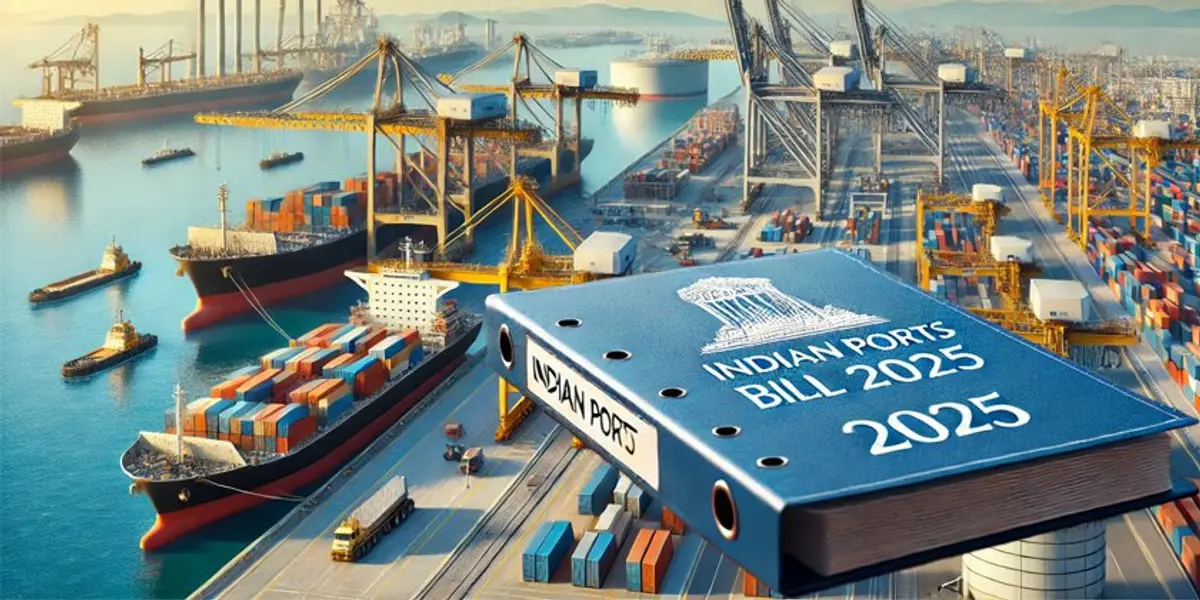
Indian Ports Act, 2025 replaces outdated provisions of the Indian Ports Act, with modern & contemporary regulations
NEW DELHI : The Indian Ports Act, 2025 replaces outdated provisions of the Indian Ports Act, 1908, with modern & contemporary regulations.
• The Act establishes Maritime State Development Council (MSDC) as a statutory
consultative body to coordinate between Centre and coastal States.
• The legislation mandates Global Green Norms, Disaster Readiness for Indian Ports.
• It simplifies port procedures & digitalise operations to enhance Ease of Doing
Business (EODB).
Ports have long served as the silent engines of India’s economic momentum. As India grows, the
strategic relevance of its maritime infrastructure has never been greater. Beyond logistics, ports are catalysts for industrial corridors, employment generation, and urban renewal.
The Indian Ports Act, 2025 passed by Parliament in August, 2025 marks a transformative milestone in India’s maritime governance – replacing the century-old Indian Ports Act of 1908 with a forward-looking, integrated framework tailored to the demands of a modern economy. The legislation reflects the Government’s vision to position ports not merely as transit points, but as engines of growth, employment, and strategic connectivity. By consolidating port laws and empowering States, the act fosters cooperative federalism and structured development across coastal states. It aims to unlock the full potential of India’s 7,500 km coastline, streamline port administration, and align domestic practices with global maritime
standards. As India charts its course toward becoming a global maritime leader, the Indian Ports
Act, 2025 stands as a foundational reform – anchoring efficiency, sustainability, and inclusive
progress at the heart of port-led development.
Ports play a vital role in India’s development by facilitating trade, supporting industrial growth, and enabling regional connectivity. They serve as strategic gateways for imports and exports, contributing significantly, to national logistics and supply chains. The Ports in the country handle around 95% of EXIM
Cargo by volume and 70% by value. India hosts 12 major ports and 200+ non-major (minor) ports across its coastline. The major ports operate under the administrative purview of the Ministry of Shipping, while non-major ports fall under the jurisdiction of respective State Maritime Boards or State Governments. All major ports are fully operational; among the non-major ports, around 65 handle cargo, while the remainder function as designated “Port Limits” primarily serving fishing vessels and small passengers ferries across creeks and inland waterways.
Over the past decade, India’s maritime sector has undergone a remarkable transformation,
emerging as a key driver of economic connectivity and logistics efficiency. Major ports have
significantly scaled up their handling capacity and operational performance to match
international standards. This momentum has strengthened domestic trade routes as well as elevated India’s global standing. The sector’s evolution underscores the strategic importance of
ports in shaping India’s future as a maritime power.
In light of these developments, the recently enacted Indian Ports Act, 2025 marks a pivotal
reform by replacing colonial-era legislation with a modern framework that promotes integrated
development, strengthens Centre-State coordination, aligning India’s port governance with global
best practices, and boosting India’s strategic maritime capabilities.
The Indian Ports Act, 2025 introduces a modern regulatory framework to enhance governance,
transparency, and sustainability across India’s port ecosystem. It empowers statutory bodies,
streamlines dispute resolution, and strengthens tariff regulation and environmental safeguards to
align with global maritime standards.
These measures will be transforming India’s maritime sector by streamlining legal frameworks,
promoting coordinated port development, and enhancing business efficiency. Institutional reforms
will empower states and foster strategic planning through dedicated bodies like State Maritime
Boards and the Maritime State Development Council. Digitalisation plays a key role in improving
port operations, with initiatives like the Maritime Single Window and Advanced Vessel Traffic
Systems helping to boost efficiency, ease congestion, and lower operational costs.
The Indian Ports Act, 2025 emerges as a timely and transformative step toward modernizing and
unifying port laws, boost development, and make business easier. It sets up strong governance
bodies at the state and national levels, ensures safety and sustainability at ports, and aligns India
with global standards. It also introduces systems to resolve disputes efficiently.
The passage of the Indian Ports Act, 2025 marks a defining moment in India’s maritime journey—
ushering in a future-ready framework that replaces colonial-era legislation with a modern,
transparent, and growth-oriented approach. The Act reflects a strategic shift toward integrated
port development, cooperative federalism, and global competitiveness. It strengthens institutional
capacity, streamlines governance, and embeds sustainability at the heart of maritime operations.

